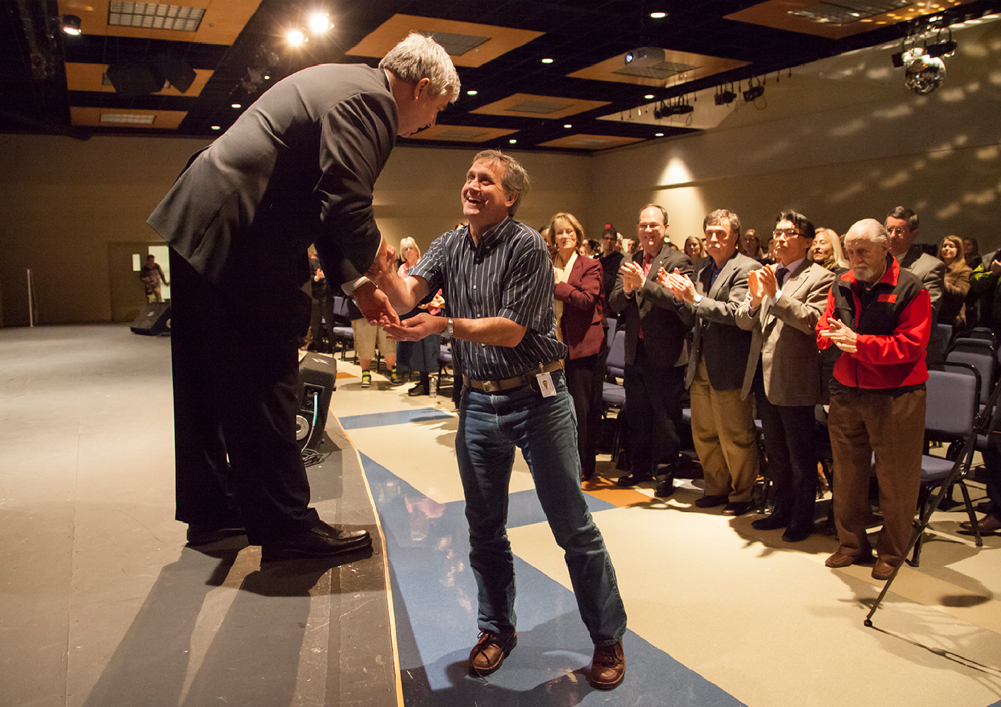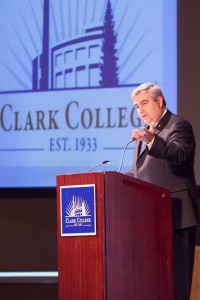The State of the College Address examines Clark College’s achievements as it approaches its 80th anniversary

President Knight bestows a Presidential Coin on Information Technology Application and Database Developer Andy Barsotti during the 2013 annual State of the College address.
As Clark College nears its 80th anniversary, its longevity can be seen both as one of its greatest challenges and as one of its greatest strengths. Clark College President Bob Knight explored that theme during his annual State of the College Address, held January 17 in Gaiser Student Center.
“When you’ve been part of a region for 80 years, most people know your name,” he said to an audience composed of Clark College employees, students, and community leaders. “They know of you. But they may not know much about you. Or they may remember you as you were years ago. They may not know who you are today.”
Knight went on to list some of the things that distinguish Clark College from other community colleges in the region, including its outstanding engineering, nursing, dental hygiene, welding, machining, automotive, diesel and other programs; its Running Start program (the largest in the state); its eLearning program, which 20 percent of all for-credit students participate in; its exemplary Mature Learning program; and its partnerships with regional development organizations including the Columbia River Economic Development Council, Southwest Washington Workforce Development Council, WSU Vancouver, the High Tech Council of Clark County, and local school districts. He also noted that last year Clark became Washington state’s largest single-campus community college in terms of for-credit classes, serving 26,000 students each year.
“We are not the small college that many people remember,” he said. “We are big, and we are growing.”
Knight elaborated on the many ways Clark is growing, both physically–through such projects as a new STEM building on its main campus and a new campus in northern or central Clark County–as well as instructionally and organizationally. He noted that the college has begun developing new programs like Health Informatics and Mechatronics to meet new workforce needs, and may consider offering bachelor’s degrees in some fields in the future. He added that the college would work with WSU Vancouver in creating any such degree programs.
Knight listed other ways the college is growing and adapting. He highlighted the college’s recent use of lean processes to improve how both Student Affairs and Instruction function. He pointed out the benefits of two recent relocations: those of Corporate and Continuing Education and of Adult Basic Education/English as a Second Language. CCE’s move to downtown Vancouver, he said, has helped it to provide more support for the local business community. ABE/ESL’s move from Town Plaza to the “T Building” across Fort Vancouver Way from the main campus, meanwhile, has provided its students with greater access to student services and educational opportunity.
“We hope they will not just complete basic education, but will cross the road to continue their education by taking college courses,” Knight said of those ABE/ESL students.
Knight pointed out that all of these improvements and developments are being done at a time of deep budget cuts. At Clark’s 75th anniversary, he said, about 60 percent of the college’s funding came from the state; today, that number is below 40 percent. This has resulted in a higher economic burden on students, who have seen regular tuition increases–as well as on faculty and staff, who have accepted temporary 3-percent wage reductions.
Knight thanked the Clark College Foundation for its work in raising funds to improve programs despite state budget cuts–while acknowledging that such success creates its own challenge. “Ironically, because the Clark College Foundation does such great work, they have a perception problem,” he said. “Some people believe they have more than enough money to meet the needs of the college. That’s just not true.”
Knight concluded his speech by asking audience members–both employees and students, as well as friends and community leaders–to work together to support the college.
“Together, we can support our students’ dreams–and fulfill our vision for our college and our region–by putting Clark first,” he said.
Afterward, many in the audience walked across the street to view the new ABE/ESL facilities. One such person was Vancouver City Councilor Jeanne Harris, who attended Clark herself. As she walked, she said that she appreciated Knight’s overview of where the college is–and where it is heading.
“It helps those of us who are on campus maybe once a year to put it all together,” she said. “It made me proud of Clark College.”
Photos: Clark College/Jenny Shadley













